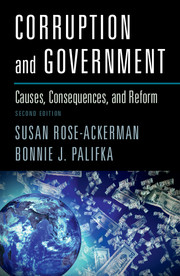Book contents
- Frontmatter
- Dedication
- Contents
- List of Figures
- List of Tables
- List of Boxes
- List of Acronyms
- Preface to the First Edition (1999)
- Preface to the Second Edition
- Acknowledgments
- INTRODUCTION
- PART I CORRUPTION AS AN ECONOMIC PROBLEM
- PART II CORRUPTION AS A CULTURAL PROBLEM
- PART III CORRUPTION AS A POLITICAL PROBLEM
- PART IV REFORM AGENDAS: DOMESTIC POLITICAL WILL AND INTERNATIONAL INFLUENCE
- 13 Domestic Conditions for Reform
- 14 The Role of the International Community
- 15 International Cooperation: States, Firms, Banks, and Organized Crime
- CONCLUSIONS
- References
- Index
14 - The Role of the International Community
from PART IV - REFORM AGENDAS: DOMESTIC POLITICAL WILL AND INTERNATIONAL INFLUENCE
Published online by Cambridge University Press: 05 March 2016
- Frontmatter
- Dedication
- Contents
- List of Figures
- List of Tables
- List of Boxes
- List of Acronyms
- Preface to the First Edition (1999)
- Preface to the Second Edition
- Acknowledgments
- INTRODUCTION
- PART I CORRUPTION AS AN ECONOMIC PROBLEM
- PART II CORRUPTION AS A CULTURAL PROBLEM
- PART III CORRUPTION AS A POLITICAL PROBLEM
- PART IV REFORM AGENDAS: DOMESTIC POLITICAL WILL AND INTERNATIONAL INFLUENCE
- 13 Domestic Conditions for Reform
- 14 The Role of the International Community
- 15 International Cooperation: States, Firms, Banks, and Organized Crime
- CONCLUSIONS
- References
- Index
Summary
Policies to control corruption will always be controversial and contested. Those subject to increased surveillance or limits on their discretion will bewail the lack of trust these constraints imply. They will complain that the new controls are politically motivated, and that they fail to respect cultural norms. These objections will be particularly evident if anti-corruption measures are imposed or supported by international actors – most notably aid and lending bodies, global nonprofits, or international treaties. The role of international institutions is necessarily limited, given the dominant position of nation-states. Nevertheless, well-executed international efforts can benefit ordinary people and may help, rather than harm, domestic and global businesses. The only losers are those who have benefited from corrupt transactions both in government and in the private sector. The most difficult cases are polities in which corruption is so deeply embedded that almost everyone is somehow entwined with the corrupt system.
International institutions, especially the World Bank, began to promote an anticorruption agenda in the mid-1990s. The end of the Cold War facilitated these initiatives because corrupt rulers could not continue to play off one bloc against the other. For a time, the anti-corruption agenda of international institutions and their powerful backers in wealthy countries faced no significant opposition; the bargaining power of domestic anticorruption advocates also increased.
But recently, the rise of global direct investment and finance from China and other countries that were not part of the initial “anticorruption consensus” has given some political leaders leverage to resist reform, especially if the host state is resource rich. As Fariello and Bo (2015: 422) assert, “[D]eterrence-based enforcement approaches may simply drive some of the Bank's client countries (and the private sector) toward projects financed by donors with fewer legal constraints (so-called black knights).” We do not mean to suggest that the leaders of emerging middle-income countries actively encourage their overseas investors’ corruption or benefit from it personally. In fact, they may also be trying to limit its impact. Nevertheless, the growing importance of financial institutions and other multinationals from countries outside the 1990s anticorruption consensus poses a challenge. On the plus side, these entities increase competitive pressures on those based in wealthy countries, but on the negative side, if they use corrupt tactics, their actions increase the pressure on all firms to follow suit.
- Type
- Chapter
- Information
- Corruption and GovernmentCauses, Consequences, and Reform, pp. 446 - 490Publisher: Cambridge University PressPrint publication year: 2016



